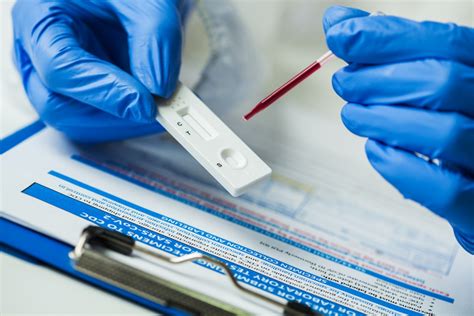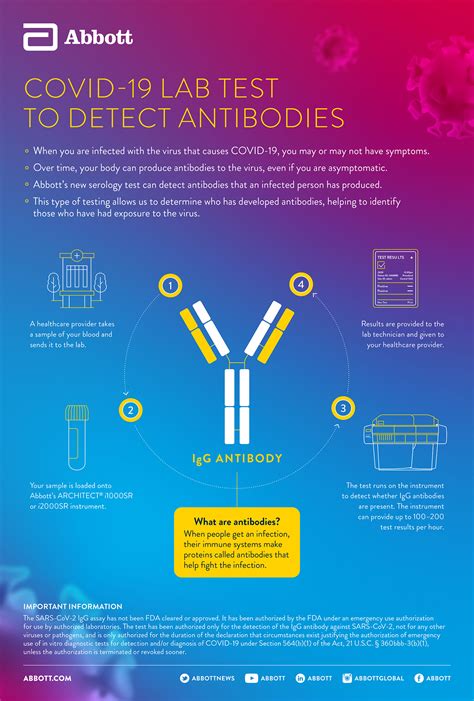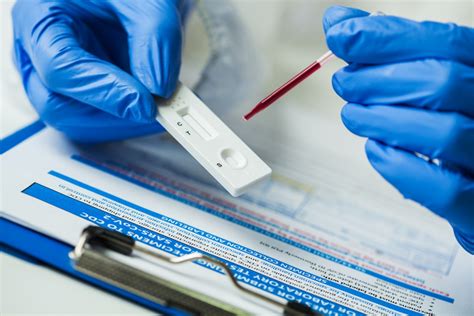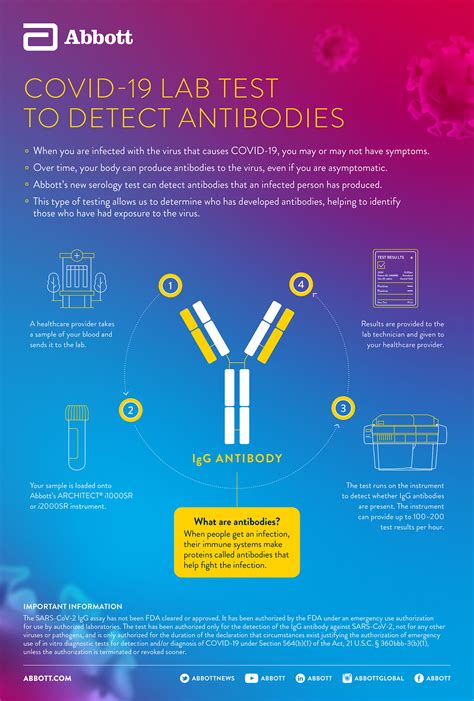Intro
Discover the Covid Antibody Test Guide, covering types, accuracy, and purposes, including IgG and IgM tests, to understand COVID-19 immunity and serology.
The COVID-19 pandemic has brought about a significant shift in the way we approach healthcare, with a strong emphasis on testing and diagnosis. One of the key tools in the fight against COVID-19 is the COVID antibody test, which helps determine whether an individual has been exposed to the virus in the past. As the world continues to grapple with the pandemic, understanding the role of COVID antibody tests is crucial for making informed decisions about our health. In this article, we will delve into the world of COVID antibody tests, exploring their importance, how they work, and what the results mean.
The COVID-19 pandemic has highlighted the importance of testing in controlling the spread of the virus. With the rapid development of vaccines and treatments, testing has become a critical component of our response to the pandemic. COVID antibody tests, in particular, have played a significant role in helping us understand the extent of the pandemic and how it has affected different populations. By determining whether an individual has been exposed to the virus in the past, these tests provide valuable insights into the immune response and can help identify individuals who may be at risk of reinfection.
As we continue to navigate the pandemic, it is essential to understand the different types of COVID tests available, including PCR tests, antigen tests, and antibody tests. Each of these tests serves a unique purpose, and understanding their differences is crucial for making informed decisions about our health. COVID antibody tests, also known as serology tests, are designed to detect the presence of antibodies in the blood, which are proteins produced by the immune system in response to a viral infection. These tests can help determine whether an individual has been exposed to the virus in the past and has developed some level of immunity.
What is a Covid Antibody Test?

A COVID antibody test is a type of blood test that detects the presence of antibodies in the blood, which are proteins produced by the immune system in response to a viral infection. These tests can help determine whether an individual has been exposed to the virus in the past and has developed some level of immunity. COVID antibody tests are typically performed on a blood sample, which is taken from a vein in the arm. The sample is then sent to a laboratory for analysis, where it is tested for the presence of antibodies against the SARS-CoV-2 virus.
Types of Covid Antibody Tests
There are several types of COVID antibody tests available, including rapid tests, ELISA tests, and neutralization tests. Rapid tests are designed to provide quick results, often in a matter of minutes, and are typically used in clinical settings. ELISA tests, on the other hand, are more sensitive and specific, but may take longer to produce results. Neutralization tests are considered the gold standard for detecting COVID antibodies, as they measure the ability of the antibodies to neutralize the virus.How Do Covid Antibody Tests Work?

COVID antibody tests work by detecting the presence of antibodies in the blood, which are proteins produced by the immune system in response to a viral infection. When an individual is exposed to the SARS-CoV-2 virus, their immune system produces antibodies to fight the infection. These antibodies can be detected in the blood using a COVID antibody test. The test typically involves taking a blood sample, which is then sent to a laboratory for analysis. The laboratory uses specialized equipment to detect the presence of antibodies against the SARS-CoV-2 virus.
Steps Involved in Covid Antibody Testing
The steps involved in COVID antibody testing are relatively straightforward. The first step is to take a blood sample from the individual, which is typically done using a needle and syringe. The blood sample is then sent to a laboratory for analysis, where it is tested for the presence of antibodies against the SARS-CoV-2 virus. The laboratory uses specialized equipment, such as ELISA or neutralization tests, to detect the presence of antibodies. The results are then reported back to the individual, typically within a few days.Benefits of Covid Antibody Tests

COVID antibody tests have several benefits, including helping to determine whether an individual has been exposed to the virus in the past. This information can be useful for identifying individuals who may be at risk of reinfection and for monitoring the spread of the virus in different populations. COVID antibody tests can also help identify individuals who have developed some level of immunity to the virus, which can inform decisions about vaccination and treatment.
Importance of Covid Antibody Tests in Public Health
COVID antibody tests play a critical role in public health, as they provide valuable insights into the spread of the virus and the immune response. By detecting the presence of antibodies in the blood, these tests can help identify individuals who have been exposed to the virus in the past and have developed some level of immunity. This information can be used to inform decisions about vaccination and treatment, as well as to monitor the spread of the virus in different populations.Interpreting Covid Antibody Test Results

Interpreting COVID antibody test results can be complex, as the results depend on several factors, including the type of test used and the individual's immune response. A positive result typically indicates that the individual has been exposed to the virus in the past and has developed some level of immunity. A negative result, on the other hand, may indicate that the individual has not been exposed to the virus or has not developed a significant immune response.
Understanding Covid Antibody Test Results
To understand COVID antibody test results, it is essential to consider the type of test used and the individual's immune response. The results may be reported as positive, negative, or inconclusive, depending on the level of antibodies detected in the blood. A positive result typically indicates that the individual has been exposed to the virus in the past and has developed some level of immunity. A negative result, on the other hand, may indicate that the individual has not been exposed to the virus or has not developed a significant immune response.Covid Antibody Test Limitations

COVID antibody tests have several limitations, including the potential for false positive or false negative results. False positive results may occur when the test detects antibodies against other coronaviruses, rather than the SARS-CoV-2 virus. False negative results, on the other hand, may occur when the individual has not developed a significant immune response or when the test is performed too early after infection.
Addressing Covid Antibody Test Limitations
To address the limitations of COVID antibody tests, it is essential to use high-quality tests and to follow proper testing protocols. This includes using tests that have been validated for accuracy and specificity, as well as following proper procedures for collecting and handling blood samples. Additionally, it is crucial to consider the individual's immune response and medical history when interpreting test results.Covid Antibody Test FAQs
What is a Covid antibody test?
+A COVID antibody test is a type of blood test that detects the presence of antibodies in the blood, which are proteins produced by the immune system in response to a viral infection.
How do Covid antibody tests work?
+COVID antibody tests work by detecting the presence of antibodies in the blood, which are proteins produced by the immune system in response to a viral infection.
What are the benefits of Covid antibody tests?
+COVID antibody tests have several benefits, including helping to determine whether an individual has been exposed to the virus in the past and has developed some level of immunity.
In conclusion, COVID antibody tests play a critical role in the fight against the COVID-19 pandemic. By detecting the presence of antibodies in the blood, these tests can help determine whether an individual has been exposed to the virus in the past and has developed some level of immunity. As we continue to navigate the pandemic, it is essential to understand the importance of COVID antibody tests and how they can inform decisions about our health. We invite you to share your thoughts and questions about COVID antibody tests in the comments below.
